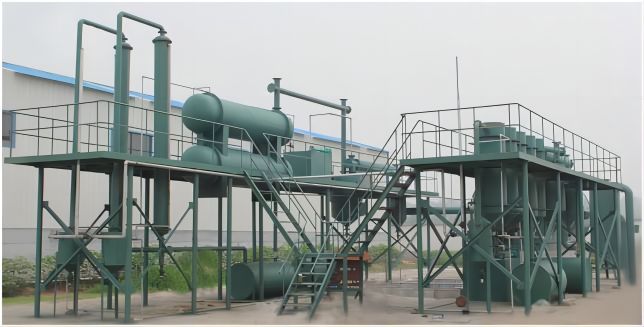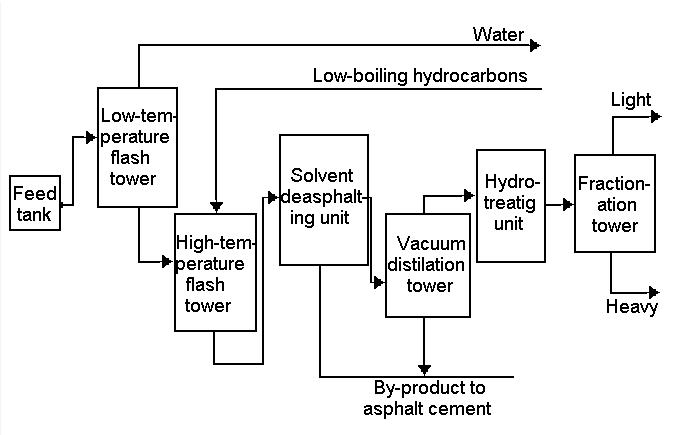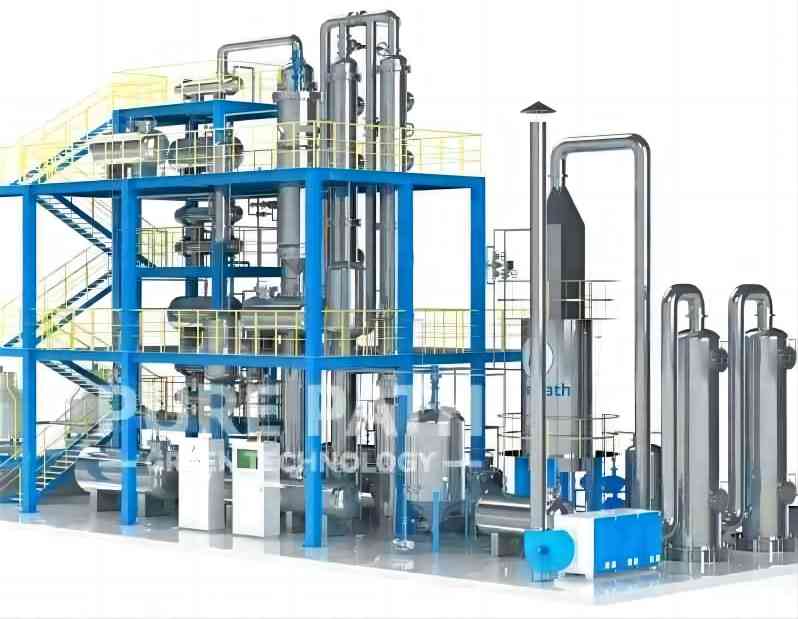Re-Refined Base Oil: A Second Life for Used Oil
Every year, millions of liters of used oil are generated from vehicles and industrial processes. While proper disposal is crucial, a hidden gem exists: re-refined base oil. This oil gets a second life through a sustainable process, offering a high-quality alternative to virgin base oil derived from crude oil. Let’s delve into the world of used oil re-refining and explore its benefits for our environment and our vehicles.

What is Used Oil Re-Refining?
Unlike virgin base oil extracted from crude oil, re-refining takes used oil through a multi-step process that breathes new life into this valuable resource. Think of it like taking a well-worn pair of jeans and transforming them into something useful and stylish again. The used oil undergoes a meticulous cleaning process. First, any large particles and water are removed through pre-treatment. Then, the oil enters a multi-stage purification phase. Here, advanced techniques like distillation, filtration, and solvent extraction come into play. These processes act like a team of expert cleaners, meticulously removing contaminants and additives that have accumulated during the oil’s previous use.
The result? Clean base oil, stripped of impurities and ready to be reborn into high-performing lubricants. This revitalized oil not only regains its lubricating properties but can even meet or exceed the standards set for virgin base oil.
What is The Used Oil Re-Refining Process

The re-refining process is quite sophisticated, but here’s a closer look at the key stages:
- Collection: Used oil is collected from various sources like service stations, quick lube facilities, and industrial facilities. This initial step is crucial to ensure proper handling and prevent contamination.
- Pre-Treatment: The collected oil undergoes initial treatment to remove large particles and water. This might involve settling tanks or filtration systems to remove things like dirt, metal shavings, and other debris that could hinder the refining process. Water removal is also important, as it can affect the quality of the final product.
- Multi-Stage Purification: This is the heart of the re-refining process, where the actual “cleaning” takes place. Here’s a breakdown of some common techniques employed:
- Vacuum Distillation: The oil is heated under a vacuum, causing it to vaporize at a lower temperature. These vapors are then condensed and separated based on their boiling points. Lighter components like water are separated from heavier hydrocarbon molecules that form the base oil.
- Solvent Extraction: Specialized solvents are used to selectively remove unwanted contaminants like oxidation products and additive residues from the oil. The solvent itself is then recycled and reused for further processing.
- Hydrotreatment: This process uses hydrogen gas and a catalyst at high temperatures and pressures to remove sulfur and other impurities that can negatively impact the performance and stability of the base oil.
- Quality Control: After going through these purification stages, the re-refined base oil undergoes rigorous testing to ensure it meets industry standards for performance and quality. These tests measure properties like viscosity, oxidation stability, and wear protection to guarantee the re-refined oil is just as effective as virgin base oil in lubricating engines and machinery.

What are the Environmental Advantages of Used Oil Re-Refining?
Used oil re-refining stands out as a champion for environmental sustainability compared to traditional virgin base oil production. Here’s a deeper dive into its eco-friendly benefits:
- Reduced Reliance on Fossil Fuels: Extracting crude oil is an energy-intensive process that disrupts ecosystems and leaves a significant carbon footprint. Re-refining used oil taps into a readily available resource, significantly reducing the need to drill for new crude. This translates to less environmental damage associated with exploration and extraction activities.
- Lower Greenhouse Gas Emissions: The entire lifecycle of virgin base oil production, from extraction to refining, generates significant greenhouse gas emissions. Re-refining, on the other hand, is a much cleaner process. It requires less energy compared to virgin base oil production, resulting in a much lower carbon footprint. This translates to a smaller contribution to global warming and climate change.
- Responsible Used Oil Management: Used oil, if not disposed of properly, can be a major environmental hazard. It can seep into the soil and contaminate groundwater, harming plant and animal life. Re-refining provides a safe and responsible way to manage used oil. Instead of ending up in landfills or leaking into the environment, used oil gets a second chance at life, preventing potential pollution.
- Conservation of Resources: Crude oil is a finite resource, and its continued use puts a strain on the environment. Re-refining used oil extends the lifespan of a valuable resource. By maximizing the use of existing oil, we can conserve natural resources and reduce the need to constantly explore new sources.
- Energy Efficiency: The re-refining process itself is much more energy-efficient compared to virgin base oil production. It requires less energy to remove contaminants and purify used oil than it does to extract and refine crude oil. This translates to less reliance on fossil fuels for the refining process itself, further reducing the overall environmental impact.
In conclusion, used oil re-refining offers a compelling solution for a more sustainable future. By choosing lubricants made with re-refined base oil, we can collectively contribute to a cleaner environment, conserve resources, and reduce our dependence on fossil fuels.
Applications of Re-Refined Base Oil

Re-refined base oil isn’t just a niche product for eco-conscious consumers. Due to its high quality and versatility, it finds application in a wide range of lubricants, playing a vital role in keeping our vehicles and industries running smoothly. Here’s a deeper look at how re-refined base oil is utilized:
1. Motor Oil: Re-refined base oil can be formulated into high-performance motor oils meeting the latest American Petroleum Institute (API) standards. These oils offer excellent viscosity control, wear protection, and thermal stability, keeping your engine running smoothly and efficiently. Whether you drive a high-performance car, a daily commuter, or a light truck, there’s a re-refined base oil motor oil suitable for your needs.
2. Industrial Lubricants: The demanding world of industrial machinery requires robust lubricants. Re-refined base oil shines in this area, formulated into industrial lubricants for various applications:
Hydraulic Oils: These oils ensure smooth and precise operation of hydraulic systems in heavy machinery, construction equipment, and machine tools. Re-refined base oil provides excellent anti-wear properties and resists breakdown under high pressure.
- Gear Oils: Gearboxes in industrial applications experience significant stress. Re-refined base oil formulations in gear oils provide exceptional protection against wear and tear, extending gearbox life and reducing maintenance costs.
- Circulating Oils: Industrial processes often rely on circulating oils to lubricate and cool down machinery. Re-refined base oil offers excellent oxidation resistance, ensuring these oils maintain their performance over extended periods.
3. Specialty Products: Re-refined base oil’s versatility extends beyond everyday lubricants. It finds application in various specialty products:
- Greases: From heavy-duty greases for construction equipment to food-grade greases for food processing machinery, re-refined base oil can be formulated into greases with specific properties for diverse applications.
- Cutting Fluids: Metalworking processes often utilize cutting fluids for lubrication and cooling. Re-refined base oil can be used in formulating cutting fluids that offer excellent cooling properties and extend tool life.
- Metalworking Fluids: The metalworking industry relies on various fluids for tasks like drawing, stamping, and forming. Re-refined base oil can be formulated into metalworking fluids that provide lubrication, corrosion protection, and cooling for efficient metalworking processes.
By choosing lubricants made with re-refined base oil, you’re not just making a sustainable choice, you’re ensuring your vehicle or machinery receives the performance and protection it deserves. With its diverse applications, re-refined base oil is a key player in the future of sustainable lubrication.
Conclusion
Oil re-refining and the production of re-refined base oil represent a remarkable synergy of environmental responsibility and technological innovation. By giving used oil a second life, re-refining not only conserves valuable resources but also mitigates environmental pollution and reduces carbon emissions. As businesses and consumers embrace sustainability as a guiding principle, re-refined base oil stands as a shining example of how ingenuity can drive positive change, one oil change at a time.







